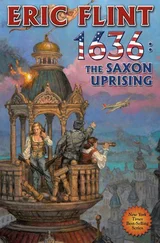Eric Flint - 1635 - The Papal Stakes
Здесь есть возможность читать онлайн «Eric Flint - 1635 - The Papal Stakes» весь текст электронной книги совершенно бесплатно (целиком полную версию без сокращений). В некоторых случаях можно слушать аудио, скачать через торрент в формате fb2 и присутствует краткое содержание. Жанр: Исторические приключения, на английском языке. Описание произведения, (предисловие) а так же отзывы посетителей доступны на портале библиотеки ЛибКат.
- Название:1635: The Papal Stakes
- Автор:
- Жанр:
- Год:неизвестен
- ISBN:нет данных
- Рейтинг книги:3 / 5. Голосов: 1
-
Избранное:Добавить в избранное
- Отзывы:
-
Ваша оценка:
- 60
- 1
- 2
- 3
- 4
- 5
1635: The Papal Stakes: краткое содержание, описание и аннотация
Предлагаем к чтению аннотацию, описание, краткое содержание или предисловие (зависит от того, что написал сам автор книги «1635: The Papal Stakes»). Если вы не нашли необходимую информацию о книге — напишите в комментариях, мы постараемся отыскать её.
1635: The Papal Stakes — читать онлайн бесплатно полную книгу (весь текст) целиком
Ниже представлен текст книги, разбитый по страницам. Система сохранения места последней прочитанной страницы, позволяет с удобством читать онлайн бесплатно книгу «1635: The Papal Stakes», без необходимости каждый раз заново искать на чём Вы остановились. Поставьте закладку, и сможете в любой момент перейти на страницу, на которой закончили чтение.
Интервал:
Закладка:
Sharon nodded stately thanks and acknowledgment.
“Cardinals Wadding and Mazzare did their jobs with all the vigor and insight that can be asked of mortal men. Their part in this is over. The first matter for us to consider if there is any basis for a lingering doubt that-although the up-timers are not constructs of the devil-it is still possible that they have been called back to our time to work as his unwitting tools.”
Urban folded his hands. “Much turns on this first matter-so much that I would be remiss to color the thinking of the most vigilant mind among us by expressing my opinion first. Therefore, Father-General Vitelleschi will share his personal judgment on this topic.” Urban sat-and smiled at Vitelleschi.
The father-general stood rigidly for a moment; Mazzare couldn’t tell if he was shocked or angry, or very possibly, both. But the Jesuit quickly schooled his expression to impassivity and folded his arms, staring downward. After almost ten seconds, he spoke, “I have heard only one credible reason that explains why Satan might choose these up-timers as his unwitting tools: that they might mislead us with new ideas for which we are simply not ready. This assertion presumes that it is perilous to embrace a doctrine for which men are not ready, or which ultimately distracts them from the salvation of their souls. Bellarmine rightly said that ‘Men are so like frogs. They go openmouthed for the lure of things which do not concern them, and that wily angler, the Devil, knows how to capture multitudes of them.’”
Vitelleschi looked around the room. “What could be more tempting to us down-timers than the wealth of information that arrived along with Grantville? And surely, their record of societies which successfully embraced absolute religious toleration is a nearly irresistible lure for the war-weary people of this world. Satan would also foresee that, precisely because the up-time knowledge is so empirically sound, the principle of absolute toleration might acquire an unwonted halo of implicit truth just by sharing common origin with all the rest of the authoritative information they brought to us.”
Vitelleschi’s brows lowered. “This is precisely the kind of trap that The Deceiver would lay for us. Eager for the promise of peace, our multitudes might poison themselves by drinking in such spirits, Holy or otherwise, distilled during the up-timers’ further centuries of strife and tribulation. As Cardinal Wadding argued, the up-time nations may have been prepared to healthily imbibe this potent liquor, but ours may not be.”
Mazzare looked over at Wadding, expecting to discover him swelling at the scent of approaching victory, but the Irish cardinal was strangely quiet, listening carefully.
“However,” said Vitelleschi, “we must now measure this hypothetical threat against the very solid-even bloody-reality of this moment. To be blunt, does it seem plausible that these up-timers-who have risked themselves for us, for our Church, our pope-could in fact be the Devil’s tools?”
Vitelleschi shook his head. “The answer is obvious if we simply reverse the question: would we be alive this moment if they were the Devil’s tools? Less than twelve hours ago, our survival and the future of the legitimate Church rested in the hands of these up-timers and their allies. That I stand here now, alive and speaking, is all the proof I need that they are not agents of darkness. Yes, I may be able to imagine fabulous plots in which Grantville is Satan’s ultimate and pivotal conceit, but they all collapse under the weight of this momentous fact: if it were not for the up-timers last night, the Church would not exist this morning. Satan had his opportunity to strike a mortal blow last night, but instead, his hopes died along with Borja’s assassins-all slain by up-timers and their allies.”
Vitelleschi’s proud neck went erect again. “And so I conclude-” he surveyed the up-timers sternly “-that whatever else they might be, the up-timers are not Satan’s unwitting tools.” With a brief glance at Urban-was it defiance, pride, annoyance? — the father-general sat.
Urban stood, and suddenly, Larry could hardly recall what Vitelleschi had said, because he knew he was about to hear history being made. And also, he was about to learn whether he was going to be traveling to the USE and living a while longer, or die very soon, because if Urban struck out on his own, Larry would have to-and wanted to-follow him. And they would all soon be found and killed, like rabbits beneath the teeth of wolves.
“I thank the father-general for his illuminating and instructive reasoning on the matter of our up-time friends, who, I now pronounce, speaking ex cathedra, to be found no different than the other children of God, possessed of the same graces, flaws, and origins as the rest of us. Now, let me speak to the other issues at hand.
“Since we have now accepted that the up-timers are neither satanic agents or dupes, then we are, de facto, accepting the reality of their future world. Which means that the later popes of their world are most assuredly popes. And this, in turn means that I acknowledge that they, too, enjoyed the grace of the Sacred Magisterium and thus were infallible in matters of faith and morals.
“Which brings us inevitably to the next point: by acknowledging them as true popes, one must also then acknowledge that God guided them to convene the council known as Vatican Two. And although God’s instruction to them does not constitute instructions to me, His inspiration and intents were manifest in that council and the doctrines arising therefrom. And so I must bear in mind their decisions and deeds as I consider my own.
“However, let us now address the crux of the matter: are the decrees of pontiffs from a future world that will now never exist to be obeyed in this one? I cannot see how that could be. The papacy is not only a succession of men, but of interactions between man and God. Consequently, it is logical that a later pope may not question the charism of an earlier pope, whose deeds and relationship with God must necessarily shape those of his successors. But to obey the dictates of a pope who came after me? In this, Cardinal Wadding is certainly right: Vatican II’s papal and consular authority must be constrained to your time, Cardinal Mazzare, because it was informed by centuries of history-both papal and global-that came after this century. How could the needs of your twentieth-century Church be no different from the needs of this one? The charism of perfection that attends the Sacred Magisterium made Vatican II’s doctrines perfect insofar as they reflect God’s grace in answering the questions and quandaries that were particular to the Church in your bubble of time and space.”
Urban made a small, circular gesture. “This bubble- our bubble-is not that bubble. So I must believe that, even if we asked the same questions that your Church did, the answers would be different. If Vatican II was accepted without modification in this world, it would trigger far more schisms and wars than it would prevent, despite the fact that it provided timely and essential answers to challenges that had long vexed the Holy See of the twentieth century.”
Perhaps Urban saw the worried eyes of his audience; he smiled and nodded. “However, it is also true that the mind of God does not change; man changes. And the way in which Vatican II does apply to this time, and this world, is that it is a further revelation of the mind of God. And particularly important is its renewed emphasis upon one of the most fundamental truths Christ brought to us: we are not to convert others by the exercise of power, but by examples of perfection-by living in as Christ-like a fashion as possible.”
Urban spread his hands. “When did Christ ever instruct us to do violence upon others? At what sermon did he commend our evangelical duty to the force of weapons, instead of words? He preached the tolerance and hope and charity that your popes reaffirmed through the Apostolic Constitutions that arose from Vatican II. And although those Constitutions were not issued in or to this world, and are thus not specifically binding upon us, I acknowledge that they reflect the will and mind of God. Which leads me to conclude that, since we cannot accept the specific doctrines and language of your Vatican II, it is incumbent upon me to convene one of our own.”
Читать дальшеИнтервал:
Закладка:
Похожие книги на «1635: The Papal Stakes»
Представляем Вашему вниманию похожие книги на «1635: The Papal Stakes» списком для выбора. Мы отобрали схожую по названию и смыслу литературу в надежде предоставить читателям больше вариантов отыскать новые, интересные, ещё непрочитанные произведения.
Обсуждение, отзывы о книге «1635: The Papal Stakes» и просто собственные мнения читателей. Оставьте ваши комментарии, напишите, что Вы думаете о произведении, его смысле или главных героях. Укажите что конкретно понравилось, а что нет, и почему Вы так считаете.











